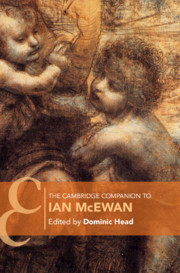Book contents
- The Cambridge Companion to Ian McEwan
- The Cambridge Companion to Ian McEwan
- Copyright page
- Contents
- Contributors
- Chronology
- Abbreviations
- Introduction
- 1 ‘Shock Lit’
- 2 Moral Dilemmas
- 3 Science and Climate Crisis
- 4 The Novel of Ideas
- 5 Cold War Fictions
- 6 The Construction of Childhood
- 7 The Public and the Private
- 8 Masculinities
- 9 The Novellas
- 10 Realist Legacies
- 11 Limited Modernism
- 12 Narrative Artifice
- Further Reading
- Index
- Cambridge Companions To…
12 - Narrative Artifice
Published online by Cambridge University Press: 24 June 2019
- The Cambridge Companion to Ian McEwan
- The Cambridge Companion to Ian McEwan
- Copyright page
- Contents
- Contributors
- Chronology
- Abbreviations
- Introduction
- 1 ‘Shock Lit’
- 2 Moral Dilemmas
- 3 Science and Climate Crisis
- 4 The Novel of Ideas
- 5 Cold War Fictions
- 6 The Construction of Childhood
- 7 The Public and the Private
- 8 Masculinities
- 9 The Novellas
- 10 Realist Legacies
- 11 Limited Modernism
- 12 Narrative Artifice
- Further Reading
- Index
- Cambridge Companions To…
Summary
Ian McEwan claimed in 1978 that the ‘artifice of fiction can be taken for granted’, implying that the avant-garde experimentalism of the postwar era had run its course and that, going forward, writers ought not to fall into the trap of producing ‘self-enclosed “fictions”’ about the nature of fictionality. This chapter examines the ways in which this early stance changed quite considerably over time, as McEwan evolved into a socially engaged novelist of ideas who also uses fiction to deliberate in explicitly self-conscious terms on the history and ethical valences of literary form. Realism and innovation have never been opposed in his work, just as his fiction has inhabited only to refurbish numerous genre models – among them, espionage, the psychological thriller, period romance and topical satire. Lodestones for this chapter will include The Child in Time, Atonement, Saturday and Nutshell.
- Type
- Chapter
- Information
- The Cambridge Companion to Ian McEwan , pp. 181 - 196Publisher: Cambridge University PressPrint publication year: 2019
- 6
- Cited by

